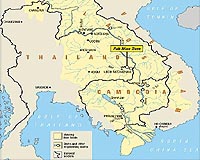| . |  |
. |
Hanoi, Vietnam (UPI) Mar 8, 2009 Vietnam is struggling with its worst drought in more than 100 years. With practically no rainfall since September, the country is facing timber fires, plagues of rice-eating insects that are destroying millions of acres of rice paddies and dried-up rivers, Time magazine reports. For a country that historically has had to cope with flash floods and landslides during the July-to-November monsoon season, the drought is taking a lingering toll on the Vietnamese. "Drought is a slow, silent disaster, which in the long run will have a more profound impact on peoples' livelihoods," Ian Wilderspin, senior technical adviser for disaster risk management at the U.N. Development Program in Hanoi told Time. Rain is not expected any time soon. The Vietnam Institute of Hydro Meteorology and Environment said Thursday that the country's ongoing drought, an aftermath of El Nino, a cyclical warming pattern, is forecast to last until May, China's state news agency Xinhua reports. The Red River, North Vietnam's largest river, is normally a bustling waterway. Typically the volume of water in the river increases by more than 60 times at the peak of the rainy season. Now the Red River is 2.2 feet deep, its lowest point since 1902 when levels were first recorded. And water levels in the Mekong Delta in south Vietnam -- called the nation's rice bowl -- have fallen to their lowest points in nearly 20 years, threatening the livelihoods of tens of millions of people who depend on the river basin for farming, fishing and transportation, Time reports. The delta faces an even greater threat: salt. Normally, salt water from the South China Sea makes its way about 18 miles inland. But this year, salt contamination is hitting areas 40 miles up the river. "Salinization has been a pattern in the Mekong Delta the last 30 to 50 years but things are getting worse every year due to climate change," Pham Van Du, deputy director at the Department of Planting in the agricultural ministry told IRIN, the news agency for the U.N. Office for the Coordination of Humanitarian Affairs. Pham estimates that more than 247,000 acres of rice in the Mekong Delta are threatened by salt contamination. Some blame China, where the Mekong begins, for Vietnam's water woes. According to the Mekong River Commission, China has built or is planning to build eight dams on its side of the border. But meteorologists say the return of El Nino is the real culprit. Wilderspin of the United Nations, however, warns that because of climate change, Vietnam would experience droughts that arrive sooner and last longer. "We have to look at the ways and means to build resilience of local communities," whether by providing drought-resistant seeds, planting different crops or protecting fresh water sources, he told IRIN. "Climate change is only going to make these cycles worse."
Share This Article With Planet Earth
Related Links Climate Science News - Modeling, Mitigation Adaptation
 Thailand wants China's help with Mekong drought: PM
Thailand wants China's help with Mekong drought: PMBangkok (AFP) March 7, 2010 Thailand will ask China for help in dealing with the record-low water levels in the Mekong River, on which more than 60 million people depend, the prime minister said Sunday. The flows are the lowest for 20 years, according to the Mekong River Commission (MRC), which has said water supply, navigation and irrigation are at threat. "We can see the level of the water is getting lower," prem ... read more |
|
| The content herein, unless otherwise known to be public domain, are Copyright 1995-2010 - SpaceDaily. AFP and UPI Wire Stories are copyright Agence France-Presse and United Press International. ESA Portal Reports are copyright European Space Agency. All NASA sourced material is public domain. Additional copyrights may apply in whole or part to other bona fide parties. Advertising does not imply endorsement,agreement or approval of any opinions, statements or information provided by SpaceDaily on any Web page published or hosted by SpaceDaily. Privacy Statement |